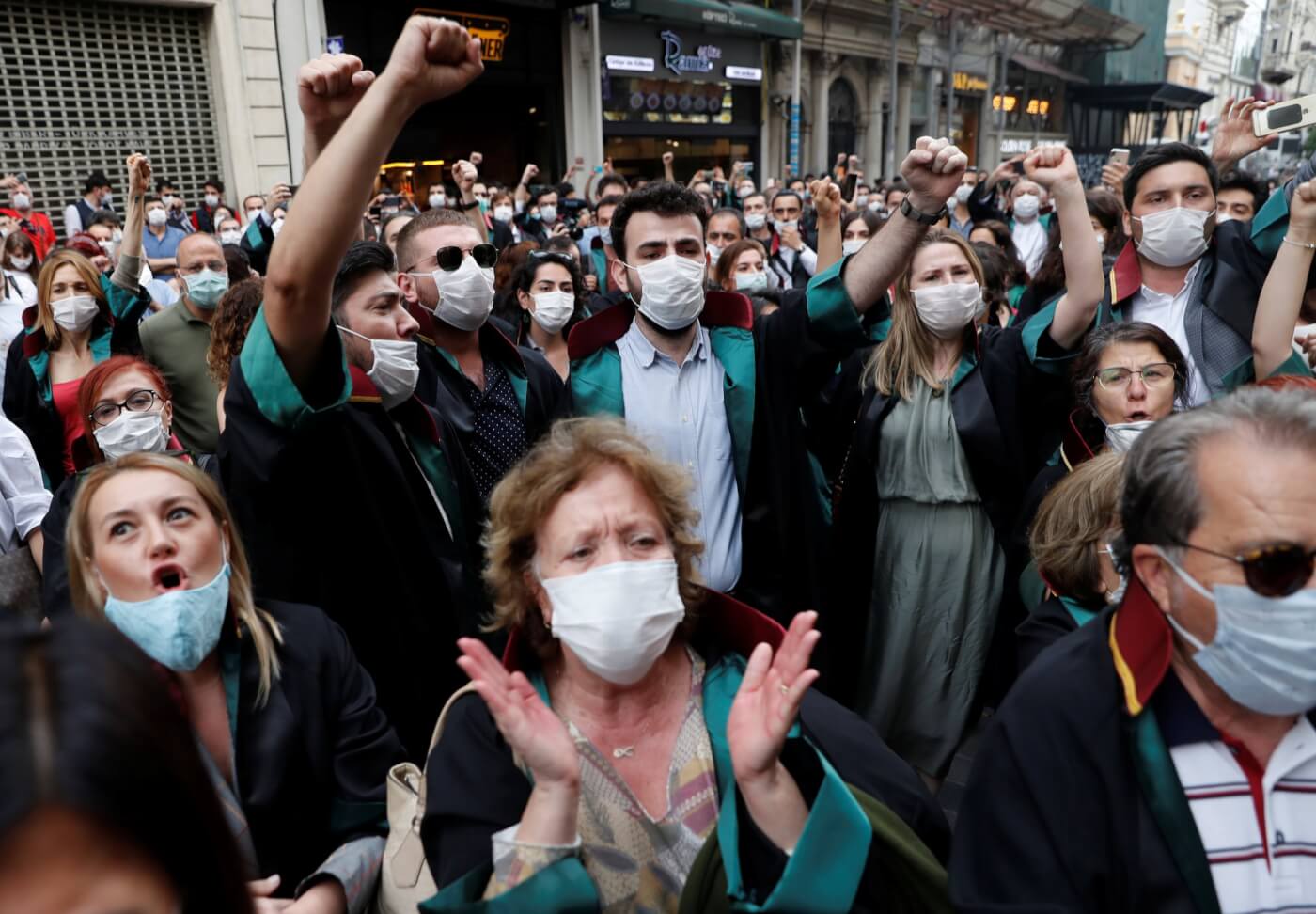On 23 June 2020, several dozen leaders of Turkish bar associations completed a “March for Defence” against a controversial government proposal that could dilute the independence of the associations.
Turkish bar associations are among the few institutions still critical of government policies following the mass purges and broader crackdown on dissident groups sparked by a 2016 coup attempt in Turkey. Most of the associations are highly critical of the government and its human rights record and say the judicial system has descended into chaos with lawyers jailed, legal defences muzzled and confidence in judges and prosecutors destroyed.
Over the weekend, the group began a nationwide protest march against a proposed bill that would change election laws for bar associations. Protesters planned to end the march at Ankara’s Anitkabir, the mausoleum for Turkey’s first president, Mustafa Kemal Ataturk, but were blocked from entering the city by police. Following brief scuffles, the lawyers camped out in the streets of the capital’s outskirts surrounded by police barricades.
“It’s a black day for Turkey as its lawyers are blocked from walking into the capital city through violence,” Erinc Sagkan, head of Ankara’s bar association, told reporters.
The lawyers started a sit-in protest following the blockade and the standoff continued for more than 24 hours, drawing press coverage and widespread condemnation from human rights advocates before the bar association chairs were permitted to reach their destination Tuesday afternoon.
Remarkable scenes inside Istanbul’s Çağlayan Courthouse as lawyers gather in support of the ‘March for Defence’ against the government efforts to curb bar associations powers. They are chanting “Defence is not and never will be silent”.pic.twitter.com/3PyvyMy2YI
— Stefan Simanowitz (@StefSimanowitz) June 23, 2020
The changes proposed to the associations’ election system by President Recep Tayyip Erdogan’s ruling AK Party are said to make it more democratic and increase representation from smaller cities but the lawyers marching say the move would pave the way for the formation of government-friendly associations.
If the draft bill becomes law, lawyers would also be allowed to form additional bar associations in provinces with more than 5,000 registered attorneys. New associations would need a minimum of 2,000 members.
Many lawyers say the proposal would limit their associations’ power of oversight. For example, they may hesitate to penalise members who violate ethics if that were to push their association below the minimum membership threshold, they say.
“The government is aiming to form multiple bar associations in the same province, thus creating conflicting associations whose power has been dimmed, through the old strategy of divide, conquer and rule,” the Istanbul Bar Association said in a statement.
According to the Arrested Lawyers Initiative, Turkish courts have convicted 321 lawyers to 2,022 years in prison in an ongoing crackdown since 2016. The organisation’s 2019 judicial year report stated that more than 1,500 lawyers have been prosecuted and 599 lawyers arrested.
Turkey ranked 109th out of 126 countries in the 2019 Rule of Law Index prepared by international civil society organisation the World Justice Project, which said Turkey was among the countries with the least constraints on government powers and had one of the worst records on fundamental rights.
Just a few days before the lawyers’ march, Turkey’s People’s Democratic party (HDP) carried out a “march for justice and democracy” after a five-day journey across the country. It culminated in a rally next to the parliament building in Ankara on Saturday 20 June 2020. The pro-Kurdish opposition party’s trip was not a smooth one: many demonstrators faced police, teargas and arrests. The party has struggled to maintain momentum after last year’s successful Istanbul election in Turkey’s increasingly hostile political and media environment.
“We are at a critical turning point in Turkey. All the opposition must meet on common ground to form a democratic alliance against one-man rule,” said Filiz Kerestecioğlu, an Istanbul HDP representative. “We must not fall into the dividing and isolating traps set by the ruling party.”

